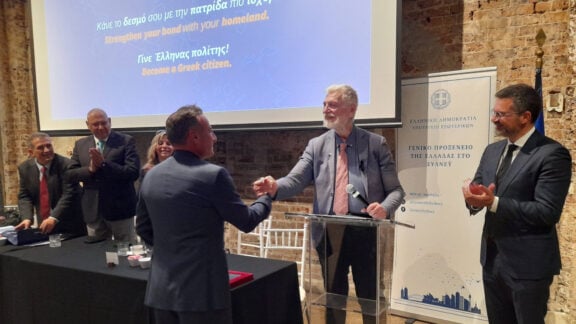As you enter the elegant terraced-house in South Yarra, Melbourne, that is base for Jon-Michail, the hallway immediately tells you that you’re in the presence of someone who has some serious friends and associates.
The right-hand wall is covered in framed photographic portraits, all celebreties with a scribbled message of thanks or best wishes to Jon-Michail, this maverick enabler of others; John Travolta, Al Pacino, Larry King, and no other than the queen of popular empowerment herself, Oprah Winfrey.
The parallel between Winfrey and Athens-born Jon-Michail is clear, as Jon welcomes me into his lair and reflects on his upbringing in Collingwood and Fitzroy, “when it was tough, not trendy,” says Jon, “we graduated to Clifton Hill,” he adds with a smile. Born in 1961, Jon-Michail came to Australia as a six-year-old and still remembers the culture shock of swapping the Athens suburb of Nea Ionia for inner city Melbourne.
“I couldn’t speak English. The tears were running,” says Jon ruefully, before adding, “there’s a lot of things you remember and others you don’t want to remember.” Jon cites Holocaust survivor Victor Frankl’s book Man’s Search for Meaning as a crucial text which has informed both his work and life.
A former designer with Christian Dior, Jon-Michail studied International Business Management at Monash University, before pioneering the concept of holistic image management, and becoming arguably Australia’s most successful ‘image advisor’, in fact, Michail is regarded, not just in Australia, but internationally, as the image advisor’s advisor. He’s a past winner of the International Image-Maker of the Year Award (USA), been a recipient of the Australian Achievers’ Award, and won the Hong Kong International Business Award, and there’s something very special about the way this articulate fifty-year-old engages with me, and everyone he meets, that lies at the heart of his success.
Dior was a stepping stone for Michail, who started his own business in the late 1980s: first came manufacturing followed by a chain of retails stores and a property development company. But success hit the buffers in a big way. “With the last crash in ’89-91′ we lost millions” says Jon, but adds enigmatically, “what I’ll say about that time, is, that while Rome was burning, I was fiddling.” It was the catalyst for Michail to change career.
“I went away from the product side and into the human side. Do you know how hard it is to work with humans? There’s nothing harder. Products don’t talk back to you.” As I listen to Jon, the question that begs to be asked, is what does Jon get out of empowering others, beyond the material rerwards that come from being in global demand. “The driving principle for me is freedom. When somebody tries to suppress my freedom I feel very uncomfortable. My grandparents came from Asia Minor. There’s a burning rage in me for justice. What I do is I work with an individual to empower them in different skill-sets, that they don’t know, that they don’t know are required,” says Jon, using a ‘Rumsfeldian’ turn of phrase. So it’s about enabling, achieving the freedom to realise our full potential.
“It’s stuff that university doesn’t teach us. We’re not taught how to become wealthy, and when I use the word wealthy I’m not just talking about money, I’m talking about ‘influential’ – empowered in different ways to build networks, whatever it is that is going to take you to that next step. Sometimes people are happy to live in ignorance, and I’m putting a mirror to their face. Sometimes I become the devil in their eyes. Do you get it?” Jon’s typical week will involve one-on-one sessions and large seminar workshops.
Working with government “is the hardest space,” says Jon, “because most government people don’t want to be empowered”. Whilst Jon’s skills are in worldwide demand by politicians, governments, business organisations and multinational corporations, when he talks about his more philanthropic work, another image of Jon-Michail comes to the fore. It’s not about empowering industry leaders or the movers and shakers of politics; it’s about a commitment to the less privileged at the margins of society, through working with non-profits, the One Life Foundation he established, as well being involved in the organisation Whitelion, which offers young offenders the chance to transform their lives.
“I don’t get funded to do that stuff, so it’s my commercial work that funds the philanthropic.” Jon describes his work with the less-advantaged passionately and in his own inimitable style.”We all like to have a good life, so tell me how to have a damn good life when I’m broke? “The best thing we can do for the poor is show them how to become rich. This is the real world. Part of your journey on this planet is to evolve. If you’re not evolving you’re taking space.” After I’ve bid goodbye and head into the Melbourne rush-hour, one of Jon’s maxims rings in my ears. “You might not like some of the things I say, but you won’t forget me.” We’re listening Jon.
Jon-Michail is Founder and CEO of Image Group International and the Institute for Image Management. Follow Jon-Michail’s blog @ jonmichail.wordpress.com







